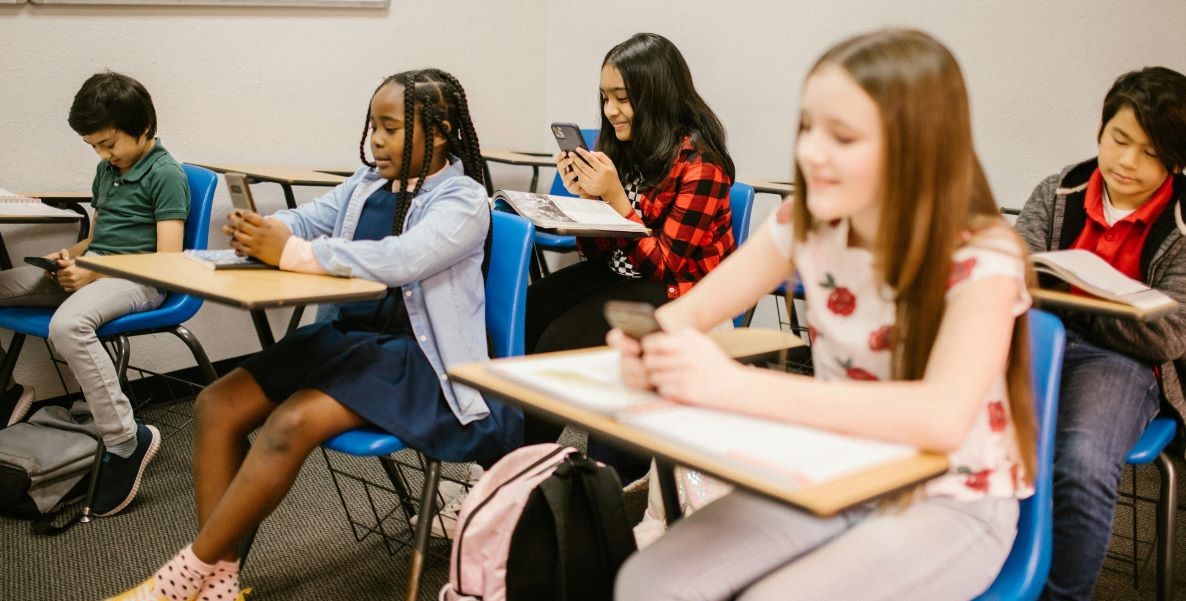Do lawmakers in Pennsylvania dare to do what many educators and parents hesitate to do: Deny cell phones to kids for the duration of each school day? The answer for now is a tentative no.
Until recently, it appeared the state might forcefully insert itself into the vexatious question of who should take phones out of kids’ hands and when. Pennsylvania Senator Ryan Aument (R-Lancaster County) was floating a proposal to ban phone use in public schools while they were in session — students carrying phones would have to keep them in “lockable bags.” What the senator had in mind was something like the magnetically locked Yondr pouches already finding broader use.
Yet what emerged from the General Assembly last week wasn’t a ban but a stiff nudge. It makes the purchase of phone bags an eligible use of state grants for “student mental health services” across the state’s 500 school districts. The fiscal 2024-25 funds appropriated for all mental health services in districts statewide is $100 million, the same amount as in 2023-24.
Whether to apportion some part of the grant money to bag purchases is thus left to each district to decide, as is the school-grade levels where bags would be used, though a phone ban of some sort is a condition of getting the money. A single Yondr pouch runs $25 to $30.
Over the past year, Aument has put forward various proposals to push for phone restrictions that varied in their reliance on a state mandate, considering, as he put it, what is “best public policy and the most politically viable.” He recalls a school visit when teachers who knew of his talk of a mandate gave him fist bumps. Now he says he will pursue a mandate going forward.
Yet despite the distractions and harms ascribed to habitual phone use among the young, not everyone was all-in for a ban the first time he proposed one. His office’s informal poll of 268 people in his district found that nearly 18 percent of respondents didn’t support a ban on use during classroom instruction. That the respondents included parents is all but certain, given observations elsewhere of parents who resist any disconnection whatsoever with their kids during the school day.
Maybe those survey results throw into doubt whether the respondents understood the question — no ban even during classroom instruction? Or maybe not. “We have parents who text kids during instruction time,” says PA Rep. Barb Gleim (R-Cumberland County). In February, Gleim introduced her own bill that, with certain exemptions, would have restricted phone use during school hours to lunchtime. That bill, however, never got out of a House committee.
Gen Z is “the first generation in history to go through puberty with a portal in their pockets that called them away from the people nearby and into an alternative universe that was exciting, addictive, unstable and … unsuitable for children and adolescents.” — Jonathan Haidt
Whether or not the state gets further involved, what to do about cell phones is an issue that isn’t going away. Aument says his concerns as a father grew after he talked with Jonathan Haidt, the psychologist and author of the bestselling The Anxious Generation. Haidt argues that Gen Z, which he defines as those born after 1995, is “the first generation in history to go through puberty with a portal in their pockets that called them away from the people nearby and into an alternative universe that was exciting, addictive, unstable and … unsuitable for children and adolescents.”
Along with debates about school policies, legal challenges to social media companies continue. One is a lawsuit brought by Bucks County in federal court against TikTok, Facebook and Snap, among others. An allegation from that complaint: “Youth mental health problems have advanced in lockstep with the growth of social media platforms by amplifying harmful material, dosing users with dopamine hits, and thereby driving youth engagement and advertising revenue.” Last month, U.S. Surgeon General Vivek Murthy called on Congress to put warning labels on social media.
Think what you will of cell phones in schools: They serve some purpose in giving parents and kids minute-by-minute access to each other, or they sidetrack the attention of students who should be training their minds on what their teachers are telling them about, say, the Bill of Rights or Macbeth or the periodic table, or they are disrupting face-to-face social life in hallways and cafeterias — disrupting or worse in the instance of cyber-bullying. But authorities everywhere are struggling to find the right way to restrict phone use among kids since it became ubiquitous.
Overseas, the U.K. is pushing for a nationwide ban on phones during school hours. In the U.S., Florida was early to act when it banned phone use in public school classrooms except for expressly educational purposes, and several other states are now advancing their own ideas. Among school districts, the nation’s largest, in New York City, is working on a policy to ban phone use in schools, and the Los Angeles district has decided on a ban already.
A growing number of schools have taken the initiative to work out their own restrictions. In middle schools of the Bristol Township School District, for instance, a teacher will tell a student using a phone in class to take it to the principal’s office and pick it up at the end of the school day. That’s after a first offense. The next time, a parent must make a trip to pick up the phone, and then, says Chris Polzer, the assistant superintendent of schools, “that’s it, once and done.” A review of phone policy across all grades is part of the district’s principals’ conference this summer.
Kimberton Waldorf School, a private school in Chester County, already requires middle-school and high-school students to put their phones away throughout the day. Brad Kershner, the dean of school, remarks: “There is no place for cell phones in schools. They are entirely detrimental. If kids have phones, they look at their phones. If they don’t have phones, they interact with one another.”
And sometimes teachers take it upon themselves to set phone policy. One example: the ninth grade faculty at Philadelphia’s Science Leadership Academy requires kids to put their phones in pouches near classroom doors.
Possibly there is another way, too, though it seems never to make the news. The parent says to the student: “Don’t forget the things you need for school today — but the phone stays home.”
Richard Koenig is the author of the Kindle Single No Place to Go, an account of efforts to provide toilets during a cholera epidemic in Ghana.
![]() MORE ON IMPROVING EDUCATION
MORE ON IMPROVING EDUCATION




